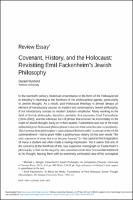Please use this identifier to cite or link to this item:
https://hdl.handle.net/20.500.12202/4333| Title: | Review Essay: Covenant, history and the Holocaust: Revisiting Emil Fackenheim's Jewish philosophy. |
| Authors: | Rynhold, Daniel |
| Keywords: | Emile Fackenheim Jewish philosophy Holocaust Judaism faith Jewish philosophers Modern Judaism |
| Issue Date: | 2016 |
| Publisher: | Cambridge University Press |
| Citation: | Rynhold, Daniel. (2016). Review Essay: Covenant, history, and the Holocaust: Revisting Emil Fackenheim's Jewish philosophy. Harvard Theological Review, 109(1), 129-143. |
| Series/Report no.: | Harvard Theological Review;109(1) |
| Abstract: | In the twentieth century, historical circumstance in the form of the Holocaust led to theodicy's returning to the forefront of the philosophical agenda, particularly in Jewish thought. As a result, post-Holocaust theology is almost always an element of introductory courses on modern and contemporary Jewish philosophy, if not introductory courses on modern Judaism simpliciter. Many working in the field of Jewish philosophy, therefore, probably first encounter Emil Fackenheim (1916–2003), and the infamous turn of phrase that ensured his immortality in the realm of Jewish thought, early on in their studies. Fackenheim was one of the most influential post-Holocaust philosophical voices in what soon became a cacophony. This German-born philosopher's (and ordained Reform rabbi's) concept of the 614th commandment—not to grant Hitler a posthumous victory (in his own words “the only statement of mine that ever became famous”)—has captured the imagination of many a student and often made a lasting impression. Yet it seems that one of the concerns at the forefront of this new expansive monograph on Fackenheim's philosophy is that for the majority, this constitutes both their first and last exposure to his thought, leaving them with an extremely contracted view of his conceptual palate. The result, noted in the book's introduction, is that Fackenheim has never really been considered a Jewish philosopher worthy of mention in the same breath as Hermann Cohen, Franz Rosenzweig, or even latterly Emmanuel Levinas and Joseph Soloveitchik. In this volume, a case is presented for including him on that list. |
| URI: | https://doi.org/10.1017/S0017816015000516 https://hdl.handle.net/20.500.12202/4333 |
| ISSN: | 0017-8160 |
| Appears in Collections: | Bernard Revel Graduate School of Jewish Studies (BRGS): Faculty Publications |
Files in This Item:
| File | Description | Size | Format | |
|---|---|---|---|---|
| covenant-history-and-the-holocaust-revisiting-emil-fackenheim-s-jewish-philosophy.pdf | author post-print | 174.73 kB | Adobe PDF |  View/Open |
This item is licensed under a Creative Commons License

